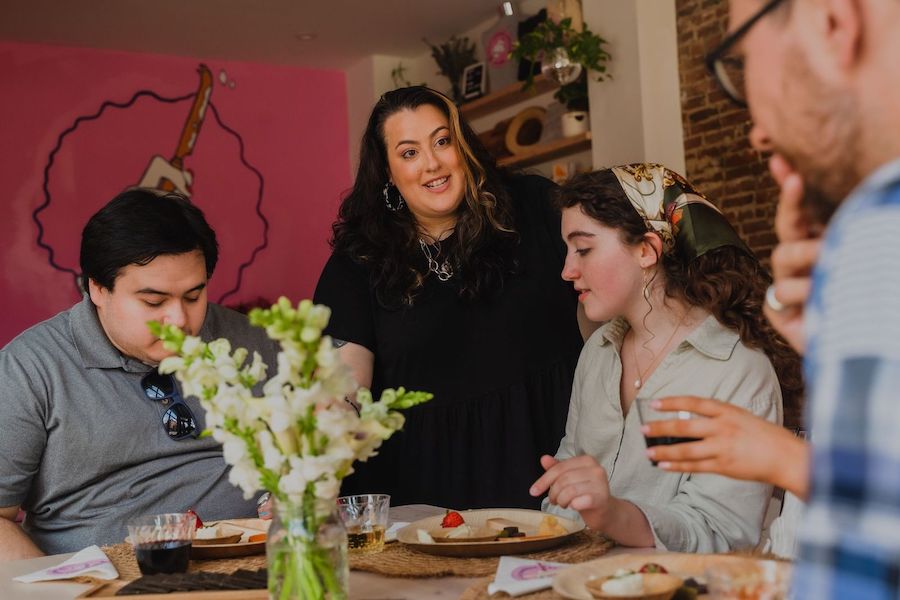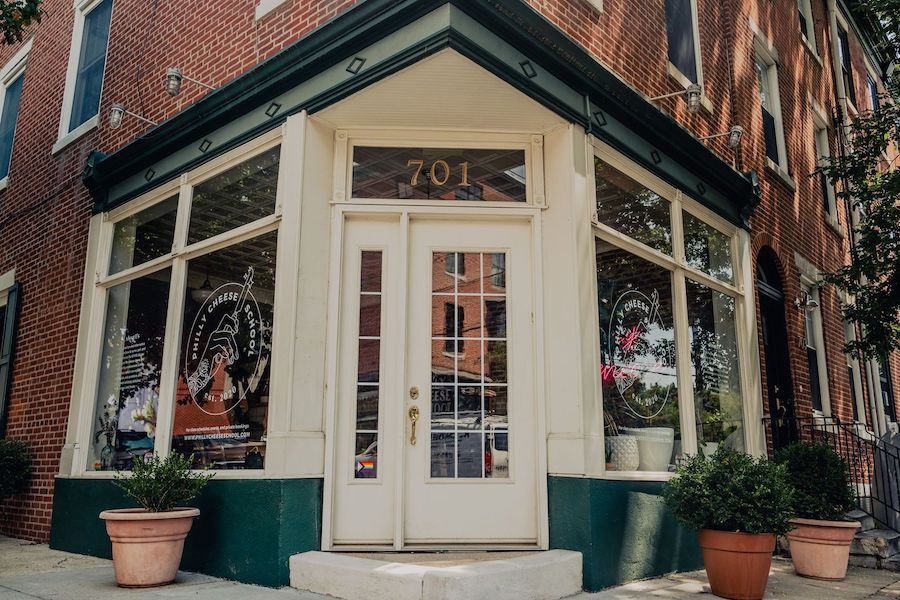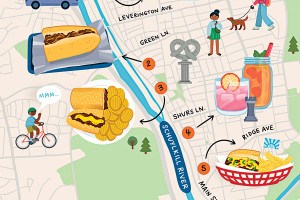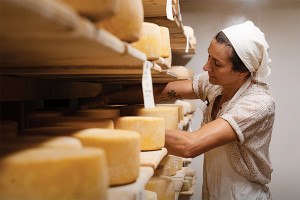Philly’s New Cheese Classroom Celebrates Femininity, Queerness, and Indulgence
Philly Cheese School founder Julia Birnbaum wants to make cheese more accessible and more playful.

Julia Birnbaum wants to teach you to love cheese in a whole new way (in a room covered in cow print and sparkles and pink). / Photography by Max Mester
While Julia Birnbaum was working as a marketing coordinator at NYC’s Murray’s Cheese in 2016, she had an idea to make cheese more fun. She started to post online videos of herself, complete with her colorfully manicured nails, gently smushing a hunk of soft cheese. These clips were uploaded as Boomerangs on Murray’s social accounts — short, mesmerizing and looping.
Birnbaum dubbed the series the Sunday Squish. And, in its own unexpected way, the sensibility behind those videos has shaped Birnbaum’s cheese career: if Birnbaum could make cheese look playful and engaging, maybe she could make learning about cheese feel exciting to wider audiences, too? “I think cheese especially has this connotation of, ‘Oh, I can’t talk about it unless I’m like a fancy French person,’” Birnbaum says. “No, pick it up with your hands and squish it.”
Last week, Birnbaum opened her own brick-and-mortar cheese classroom, the Philly Cheese School, on 9th Street in Bella Vista. It happens to be Philly’s only space dedicated entirely to learning about cheese. And though there may be fewer Boomerangs of cheese-smushing being filmed these days, the ethos behind the Sunday Squish remains.
In each Philly Cheese School class, Birnbaum guides groups — strangers, birthday parties, corporate teams, whoever they may be — through four or five cheeses plus possible pairings like honey, fruits and veggies, or even edible flowers. Part of the session revolves around mixing and matching bites (like Spanish goat’s milk with chocolate or gouda from the Netherlands and potato chips, plus whatever BYOB goods you have in tow), but much of the experience is dedicated to sharing and listening. Birnbaum runs her classes like an anarchic college professor runs a seminar, exploring how to subvert the language someone thinks they should be using to talk about cheese. “I don’t like to be told what I taste,” Birnbaum says, “I want to help people unlock their ability to taste and analyze flavors and decide if they like it for themselves… it’s almost meditative, like checking in with yourself like, ‘What’s happening in front of me and how can I fully enjoy this plate of stunning food?’”

Pairing chocolate with soft cheese during class
Just as important as finding the vocabulary to express tasting notes, to Birnbuam, is the experience of discussing how nourishing it can be to let yourself love cheese. Birnbaum calls herself an “indulgence advocate” in her Instagram bio. She wants to use the Philly Cheese School to expand Philadelphians’ relationships with eating cheese in our everyday lives. ”We end up talking about these rules about indulgence, which, to me, are connected to capitalism. We’re talking about when people are allowed to spend money and on what. We’re talking about where value should lie in terms of a market or in terms of society. And then we’re talking about who is allowed to sit down and eat something that feels really indulgent. And the answer is, you and you, and you and everybody.”
The cheese in Birnbaum’s classes — which typically come from smaller producers — certainly do not resemble the Whiz cans or the porny mozzarella-pulls that might come to mind when thinking about “cheese” and “indulgence” in the same sentence. That’s on purpose. Indulgence, at least the way Birnbaum speaks about it, includes the notion that cheese can be (and often is) nutritional and satisfying: “Artisanal cheese is made with four ingredients,” Birnbaum says, “It comes from the land. These animals are eating grasses and then converting it into this incredible, nutrient-dense milk and then it gets aged. When there’s an absence of chemicals or preservatives, it can be this really protein-rich, calcium-rich product.” Birnbaum considers cheese to be “a fabulous diet of nourishing the body and the soul.”

Birnbaum leading class
Birnbaum grew up on the Main Line and then moved to NYC after college where she started working as a pop culture and music writer for the Source and, for a brief time, an assistant to a star on Real Housewives of New York (namely, Sonja Morgan — for all you RHONY heads). She wasn’t making enough money to sustain life in NYC, so Birnbaum took a part-time counter job at Murray’s Cheese near the Source’s Manhattan office. She had never worked in cheese before, but fancied herself as someone with a family who was always somehow talking about food — the way dinner tasted, how certain wine impacted the flavor of a meal. “I think [the team at Murray’s Cheese] were just really desperate to hire somebody,” Birnbuam says, “And lightning just struck. I was introduced to not just this incredible world of products and these producers who are thinking about the lands and tradition, but I also met Cheese People.” Birnbaum affectionately describes “Cheese People” as “weirdos” and “people who talk about milk for two hours.”
Within a few months of working at Murray’s, Birnbaum had been converted into a full-fledged Cheese Person herself. To her, cheese was no longer reserved for covering other foods to make them taste better, it had its own nuanced characteristics and an intrinsic connection to agricultural tradition: the soil, the region, the animals from whence it came. Determined to follow the dairy, Birnbuam quit her journalism day job entirely and started a career as a cheesemonger while also running Murray’s social media and marketing. She eventually moved home to Philly and took a job managing Di Bruno Bros’ cheese counter at their Rittenhouse location, overseeing 400 types of cheese and all of the mongers on the floor (which could be around eight or 10 people during the holiday season).
Then the pandemic hit, and Birnbaum decided to focus on her own cheese education project. She began offering virtual cheese classes over Zoom to groups of families whose vacations had been canceled, and corporate teams at Google and AARP looking to fill the void of office happy hours. Before class, Birnbuam would ship each participant their own goodie bag of cheese. Then, on the call, the group would taste the cheese and discuss the context and flavor profile of each piece while Birnbaum answered questions along the way: “It’s amazing how many people have burning cheese questions that they’ve been sitting on their whole life.” One of those burning questions is always about whether or not you’re supposed to eat rinds, Birnbaum tells me. To set the record straight, Birnbaum has this advice: “I tell people the rind is always edible. Unless it is obviously, clearly not … like if your brain looks at it, and is like, ‘Oh, that looks like it might be wax,’ then it probably won’t enhance your cheese experience.”

The Philly Cheese School at 701 South Ninth Street in Bella Vista
Birnbaum eventually moved her Philly Cheese School’s classes outdoors, to parks around her South Philly neighborhood. One day — when she was on her way to buy cheese in the Italian Market — Birnbaum passed by a corner shop with exposed brick walls available for rent. Birnbaum signed the lease and started building her dream classroom with the intention to have the space reflect her queer identity and feel distinctly feminine.
She sees Philly Cheese School as a foil to the “masculine energy” of Philadelphia’s (particularly South Philadelphia’s) cheese scene. “There’s this really old-school kind of dude’s-club Philly vibe. You know? You see a lot of dark wicker, you see [cheese] rounds, and these intense, big-provolone-and-prosciutto-hanging-from-the-ceiling vibes,” Birnbaum says. Meanwhile, Philly Cheese School is decked out with cow print, pink, glitter and crystals. The look isn’t just for fun, it’s to make the experience accessible to anyone who might feel like the city’s cheese spaces aren’t for them.
“I want to create a space where cheese, and this cheese culture, can be celebrated and developed in ways that cater to lots of communities of people,” Birnbaum says. “People like me who really are looking for fun, who are kind of silly and not too serious. Yes, and maybe a little feminine. A place to get cheesy.”
Philly Cheese School classes are available through their website. Tickets start around $65 and each session is BYOB. Groups can rent out the entire space for $90 per person (plus a 30 percent gratuity charge). Retail cheese is not available for purchase on site, though you can pick up cheese-themed gifts in the classroom’s small market section on your way out.


